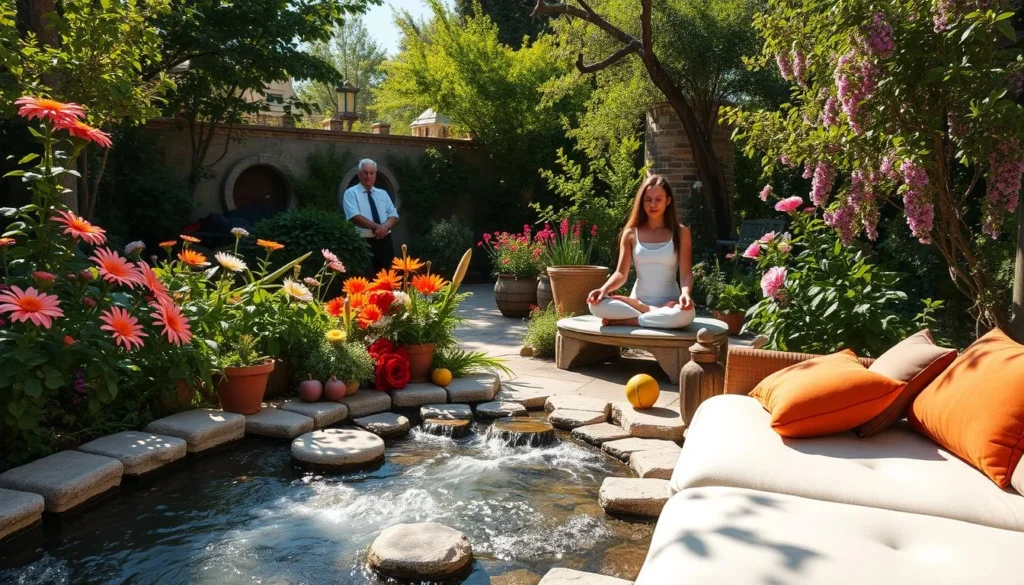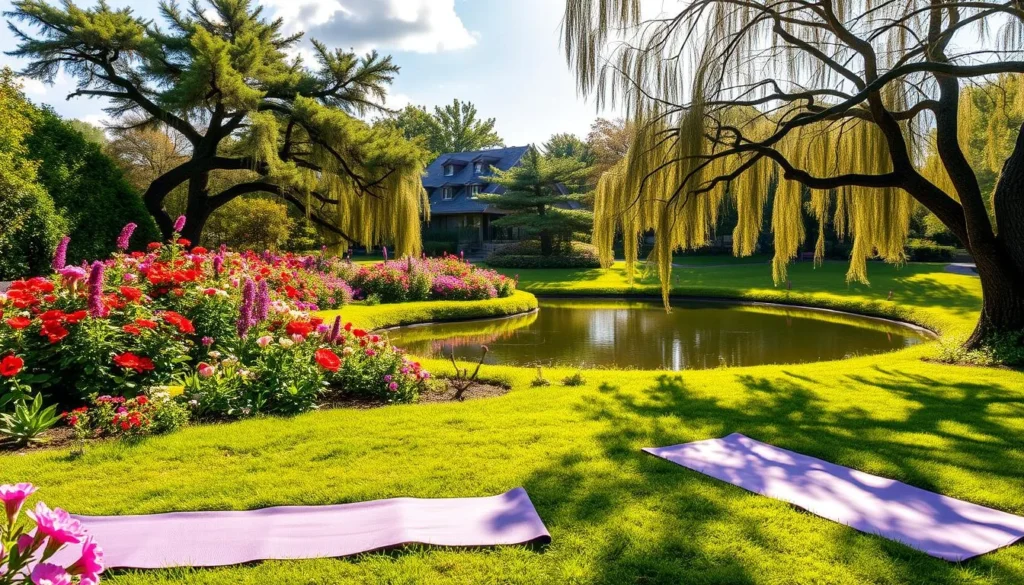Did you know over 75% of Americans feel stressed often? In a world focused on work, we often forget about our well-being. Living a healthy life filled with happiness is key to a fulfilling life. By focusing on emotional, physical, and social wellness, we can find joy.
Daily life can make it hard to find joy. But, adding simple happiness tips to our day can change everything. This not only makes our lives better but also affects those around us. Joy is more than a feeling; it’s a lasting state that boosts our mental health and balances our lives.
Key Takeaways
- Wellness includes physical, emotional, and social well-being.
- Slow changes in our lives lead to lasting joy and fulfillment.
- Good relationships make us happier.
- Regular exercise can greatly improve our mood.
- Wellness benefits not just us but also our community.
The Importance of Joyful Living
Embracing joyful living changes how we see every day. It helps us have a positive mindset and feel better emotionally. Learning to find happiness in life shows us how small changes can make a big impact.
Practices that bring joy affect not just us but also our relationships and surroundings. It’s a way to live that makes us and others happier.
Understanding Happiness in Daily Life
Happiness is more than just a feeling; it’s key to feeling well overall. Being thankful, mindful, and enjoying the little things adds to our happiness. Joyful living means finding what truly makes us happy and living it.
Simple habits can keep us feeling positive:
- Journaling to express gratitude and reflect on personal growth
- Prioritizing health through balanced nutrition and regular exercise
- Setting boundaries for work-life balance to enhance mental clarity
- Surrounding yourself with supportive and inspiring individuals
Benefits of Embracing Joyful Practices
Adding joyful practices to our lives has many benefits. They help us feel less stressed, more resilient, and live better. Joyful Living says that adding small joys to our days makes happiness easier to find.
Learning to enjoy missing out helps us find happiness without feeling rushed. This approach values taking time for ourselves and our desires.
In the end, joyful living creates a world filled with happiness and growth. By focusing on the positive, we improve our emotional health and inspire others. Together, we build a community based on truth and joy.
Wellness and Joyful Living: Cultivating Happiness

Creating a wellness lifestyle means making choices every day to be happy. It’s about living a balanced life that makes you feel emotionally, physically, and spiritually good. Self-care is key to living in harmony with your values and daily life. Adding these practices to your routine can make life more meaningful.
Creating a Balanced Lifestyle
To find harmony in your lifestyle, you need to mix different parts of your life. Here’s how:
- Setting Priorities: Focus on what’s most important to you, making sure your actions match your values.
- Time Management: Make sure you have time for work, fun, and taking care of yourself to avoid stress.
- Healthy Environment: Be around people and things that make you feel good and support your well-being.
Incorporating Self-Care into Daily Routines
Self-care is crucial for a wellness lifestyle. Here are ways to make it a regular part of your life:
- Consistent Exercise: Regular physical activity improves your mood and health.
- Mindfulness Techniques: Mindfulness helps you understand yourself better and manage your emotions.
- Nourishing Foods: Eating well is good for your body and mind.
- Relaxation Methods: Activities like yoga or meditation can reduce stress and bring peace.
By adding self-care to your daily life, you can feel happier and more fulfilled. These efforts build a strong base for a joyful life filled with harmony. Making these changes can enrich your personal and social life.
Mindfulness Practices for a Joyful Life
Starting a joyful life often means learning mindfulness. These practices help us be more aware and present. They teach us to choose our actions more carefully, making our minds more focused.
By adding simple mindfulness steps to our daily lives, we can see big changes in our mental health.
Techniques to Stay Present
Most people live on autopilot, but mindfulness helps us stay in the moment. Techniques like:
- Deep breathing exercises help us stay grounded.
- Body scans make us more aware of our bodies.
- Setting intentions helps our thoughts and feelings align.
These tips can help us think more clearly and make better choices. Doing mindful activities while exercising can also improve our mental and physical connection, reducing stress.
The Role of Meditation and Breathing
Meditation and mindful breathing are key to inner peace. Regular meditation can:
- Lower anxiety by 65% for many people.
- Help us better manage our emotions, without judgment.
- Make us kinder to ourselves, reducing self-doubt.
Daily meditation can break bad thought patterns and bring joy. It teaches us to appreciate the small things in life. Mindful breathing adds to this, helping us face daily challenges with calm and clarity.
Emotional Wellness: Strategies for Improved Mental Health

Emotional wellness is key to good mental health. It helps us deal with stress, connect with others, and make choices. It makes us happier and leads to better life choices.
Gratitude and Its Impact on Happiness
Adding gratitude to our daily lives can change our emotional health. By noticing and thanking for both big and small things, we focus on the good. Thankful people often feel happier and more satisfied with life.
This simple habit can make tough times seem easier. It builds our strength to handle challenges.
Building Resilience through Emotional Balance Techniques
Being resilient means bouncing back from hard times. It’s important to stay positive. Mindfulness and meditation help us cope with stress better.
Having strong friends and family helps too. They offer emotional support. Relaxation and exercise also help us manage stress, making us feel better.
Nurturing Relationships for a Joyful Existence

Building strong relationships is key to feeling happy and well. The connections we make with others affect our mood, work success, and health. Having a supportive group of friends and family helps us grow and stay positive.
Surrounding Yourself with a Positive Tribe
Being around positive people boosts our energy and happiness. Talking deeply with others strengthens our bonds. If we don’t communicate well, our friendships may not grow as strong.
Putting effort into our relationships can bring big rewards. It’s worth the time and effort.
Importance of Connection and Community
Being part of a community adds joy and support to our lives. Research shows that 40% of our happiness comes from our social interactions. Forgiveness and kindness in relationships help us connect better.
Creating a caring environment encourages us to give and receive. This leads to lasting happiness.
| Aspect | Impact |
|---|---|
| Health of Relationships | Influences career success, finances, and physical health |
| Positive Connections | Leads to higher energy levels and overall well-being |
| Communication | Essential for avoiding breakdowns and fostering deeper bonds |
| Mutual Support | Strengthens connections and enhances emotional support |
| Loneliness | As hazardous as smoking or alcoholism for health |
| Long-term Relationships | Predictor of healthy aging and physical health |
In today’s world, making meaningful connections is vital. By investing in our relationships, we can live a life filled with joy and support.
Mindful Eating for Holistic Well-Being

Mindful eating boosts overall well-being and joy. It makes food more enjoyable and helps us have a better relationship with it. By focusing on the senses, meals become a chance to nourish both body and mind.
Understanding Mindful Eating Techniques
Mindful eating means paying attention to what and how we eat. The key is to savor each bite, without distractions. Queen’s University research shows we have over four thoughts per minute, which can make it hard to be mindful.
Here are some ways to practice mindful eating:
- Eat slowly and deliberately
- Chew food well to aid digestion
- Eat until 80% full, following “hara hachi bun me”
- Avoid multitasking to focus on taste and texture
These practices can lower stress and improve mental clarity. They show how positive psychology can bring joy from being fully present during meals.
Nourishing Your Body and Mind Through Food Choices
Mindful eating does more than just enhance meals. It can help manage weight by listening to hunger cues and avoiding overeating. Research shows it can also lower the risk of chronic diseases.
It also helps balance the diet by linking aroma, taste, and feelings of fullness. This balance is key to healthy eating.
Mindful eating also boosts self-image. It helps accept one’s body, reducing guilt and shame around food. This practice can also improve emotional well-being, leading to better mental health and more joy in life.
| Benefit | Description |
|---|---|
| Improved Weight Management | Avoids overeating, promoting healthy weight without strict diets. |
| Enhanced Digestion | Encourages thorough chewing and slow eating for nutrient absorption. |
| Stress Reduction | Fosters a calming effect, alleviating stress and boosting mood. |
| Improved Body Image | Leads to a more positive perception and acceptance of one’s body. |
The Healing Power of Nature

Connecting with nature is more than just a walk in the park. Nature therapy offers the deep benefits of unplugging from tech. It helps us feel refreshed and emotionally balanced. Being in green spaces can make us happier, lower stress, and improve our overall health.
So, spending time outdoors is key to a healthy life. It’s a vital part of feeling whole and well.
Benefits of Unplugging and Embracing the Outdoors
Studies show nature’s amazing effects on our health. Being outside can:
- Lower cortisol levels and blood pressure.
- Reduce symptoms of depression and anxiety.
- Boost immune function and overall resilience.
- Enhance cognitive abilities, creativity, and concentration.
- Foster social connection and participatory health through group activities.
Programs, like Walk with a Doc, show the power of being active outside. They teach us to unplug and connect with nature for better emotional health.
Simple Ways to Connect with Nature Daily
It’s easy to bring nature into our daily lives. Here are some simple joyful living strategies to connect with the Earth:
- Take daily walks in a nearby park or nature reserve.
- Start a small garden to grow vegetables and herbs.
- Engage in outdoor yoga or meditation sessions.
- Participate in community gardening or conservation projects.
- Plan regular family outings to explore local natural attractions.
By following these simple steps, we improve our health and build a strong bond with nature. Nature therapy is a powerful way to refresh our spirits and increase joy.
| Nature Activities | Health Benefits |
|---|---|
| Walking in Nature | Reduces stress and lowers blood pressure |
| Gardening | Increases physical activity, boosts mood |
| Outdoor Yoga | Enhances relaxation and mindfulness |
| Participating in Conservation Efforts | Builds community connections and promotes well-being |
| Family Excursions | Encourages bonding and shared experiences |
Exercise as a Path to Wellness
Regular physical activity is key to a healthy lifestyle. It boosts mental health by releasing endorphins, which improve mood. Enjoying activities you like can make you happier and more fulfilled.
Physical Activity and Mental Health
Exercise is great for mental health. Dancing, hiking, swimming, or yoga can make you feel good. Walking or stretching regularly helps keep your emotions balanced.
Getting enough sleep, 7-9 hours a night, is also important. It helps keep your mind clear and emotions strong.
- Engaging in nature walks enhances mood and reduces stress.
- Group exercises foster social connections, boosting emotional support.
- Incorporating gentle stretching routines can alleviate anxiety.
Creating a Sustainable Exercise Routine
Creating a lasting exercise routine is crucial. Start by picking activities you enjoy. This makes staying active more fun and rewarding.
Here are some tips for a good routine:
- Choose activities that fit your schedule and interests.
- Drink plenty of water to stay hydrated and perform better.
- Set limits to avoid burnout and protect your mental energy.
- Try calming activities like yoga or tai chi for both body and mind.
- Keep a positive journal to track your progress and appreciate it.
Everyone’s journey to a healthy lifestyle is unique. Celebrate every small win to enjoy the journey. Wellness is about more than just physical health; it’s about a balanced life.
| Activity | Mental Health Benefits | Physical Benefits |
|---|---|---|
| Dancing | Boosts mood and reduces anxiety | Improves cardiovascular health |
| Hiking | Enhances mood and lowers stress | Strengthens muscles and endurance |
| Swimming | Promotes relaxation and mental clarity | Provides full-body workout benefits |
| Yoga | Increases mindfulness and emotional balance | Improves flexibility and strength |
Conclusion
Wellness and joyful living are closely linked on our journey to health and happiness. This article has shown how important holistic wellness is. Practices like mindful eating, daily yoga, and strong relationships make life more fulfilling.
Personal growth strategies, like keeping a gratitude journal or meditating for 10-20 minutes daily, boost mental and emotional health. Being around positive people and listening to loved ones strengthens your connections. This creates a supportive network that lifts your spirit.
Start your journey to health and happiness by adding these strategies to your daily life. Embrace nature, practice mindful breathing, and find your purpose. Every step towards well-being makes life more vibrant and satisfying. Let joy fill your life, leading to deep fulfillment and peace.
Source Links
- Joyful Living: Your Wellness Adventure
- Whole & Happy Living – Health & Wellness Transform Coaching
- Daily Habits for Boosting Happiness and Well-Being: A Roadmap to Joyful Living | Solh Wellness
- Joyful Living Mission Statement
- Habits to Inspire a Joyful Life – Inspire Innovation
- Cultivating Joy, Healing, and Wellness in Learning
- Cultivating Happiness – HelpGuide.org
- Cultivate Joy to Improve Well-being | IE Insights
- 5 Simple Mindfulness Practices for Daily Life
- Mindfulness Counseling for Stress Relief and Joyful Living
- LIVING IN THE PRESENT: EMBRACING MINDFULNESS FOR A JOYFUL LIFE – RK Nature
- Building Better Mental Health – HelpGuide.org
- How to Improve Mental Health: MedlinePlus
- Nurturing Your Relationships
- “Having positive, meaningful relationships can bring happiness.”
- Over nearly 80 years, Harvard study has been showing how to live a healthy and happy life
- The Benefits of Mindful Eating: How Holistic Nutrition Can Transform Your Health — Modern Nutrition & Pilates
- Mindful Eating: How to Do It, and Why You Should
- Mindful Eating: A Path to Mental Well-Being – SWEET INSTITUTE – Continuing Education for Mental Health Professionals
- Embrace the Healing Power of Nature | Johns Hopkins Center for Health Equity
- The Healing Power of Nature For Well-Being
- The Healing Power of Nature: Why We All Need a Nature Break – Embrace Health
- The Path to Wellness: A Holistic Approach to a Healthier Life
- Joyful Living: Your Wellness Adventure
- My Path to Wellness…
- The Path to Joyful Living: 7 Daily Practices to Cultivate Happiness and Fulfillment – Ojaswin Blogs
- Enjoy Joyful Living for a Fulfilling and Meaningful Journey – JoyScore: The Joy Of Self Care

